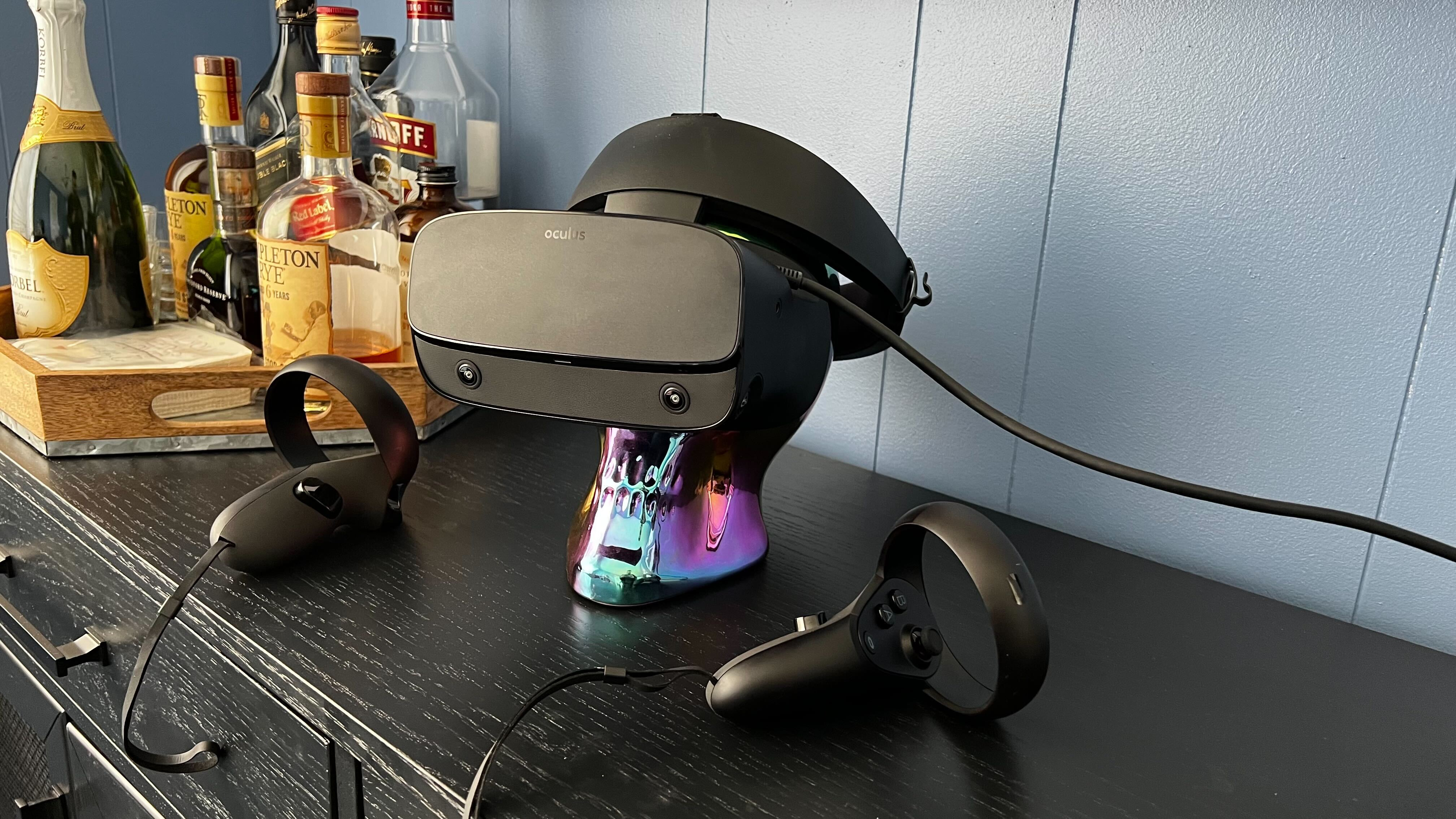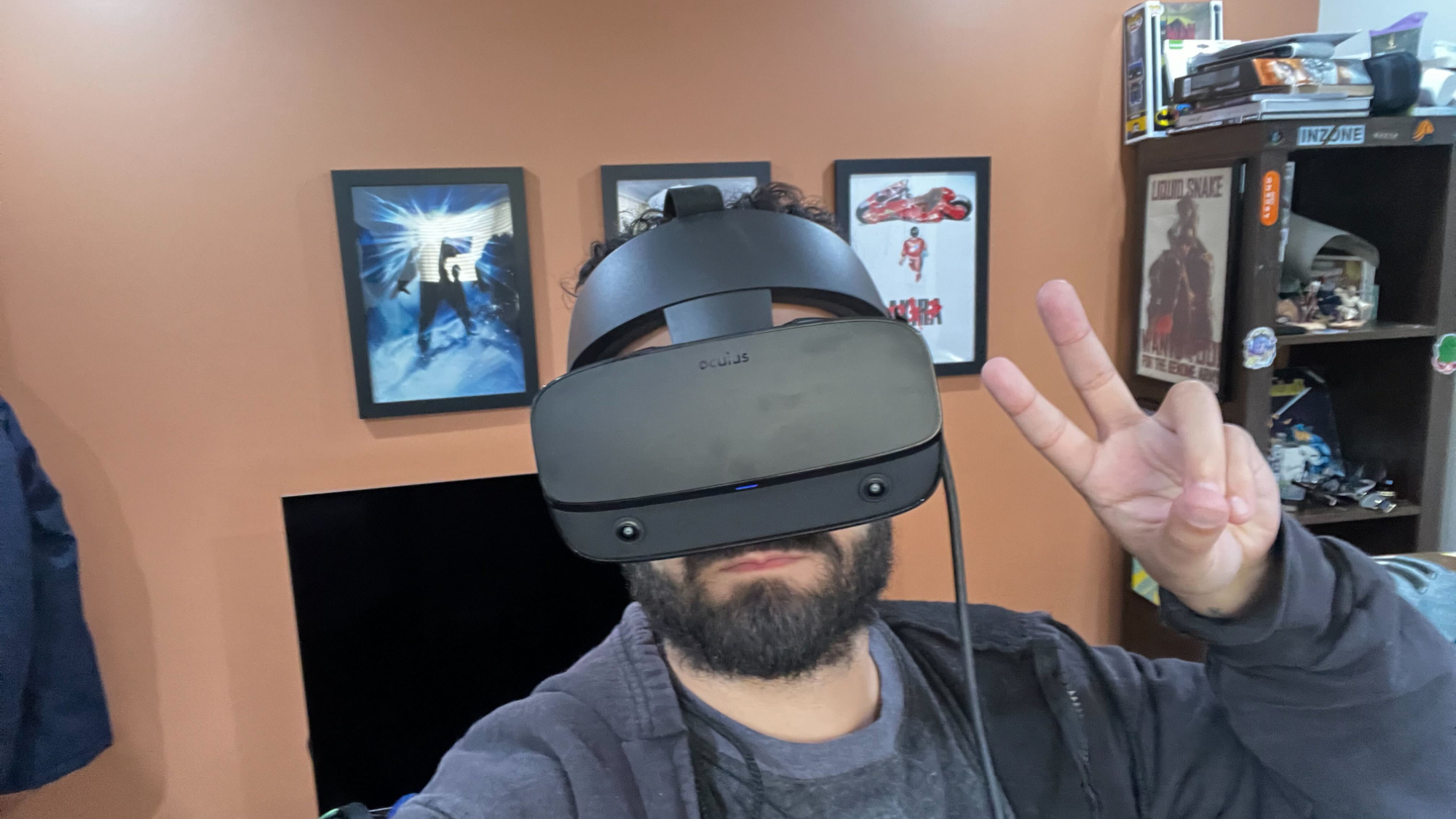

This month I have been mostly playing Resident Evil 4 remake and Wartales.
I've been finding shooting zombies with a rocket launcher and terrorizing the countryside with a band of trouble-making medieval mercenaries to be the vibe I've needed the last few weeks.
This month I have been testing a bunch of games in VR.
After a few more hours, I'm sure I will get my certification as a VR trooper. I've been hooked on Walking Dead: Saints and Sinners, No Man's Sky, and Battlegroup VR, but looking forward to playing Half-Life Alyx, assuming it ever drops in price.
I've always had a strange relationship with VR gaming. I've always enjoyed watching the strides the technology has taken and checking out what sort of wild VR hijinks developers have come up with. Despite that, I've never been able to get comfortable wearing a headset or been able to find the right games to keep me returning and spending the cash.
But I recently got my hands on an Oculus Rift S and decided to give VR gaming another shot figuring that the technology and games have come a long way. And after seven years of not taking VR seriously, it's safe to say I'm now a believer, especially since we are past sole VR 'experiences' and into actual games.
A problem I've had with many VR headsets, such as the first Rift, the HTC Vive, and later the Valve Index (aside from being wildly expensive), has mostly been with set-up and comfort. Before inside-out tracking became the new standard for VR headsets, you had to deal with base stations that helped map your play space and controller tracking. You had to place them at the right height and distance apart for optimal tracking, or else you'd risk having to calibrate your controllers every time your hands moved out of view.
This meant sticking them on a desk or window sill, or sticking a stanchion to the wall with gaffer tape, which ended up making my bedroom look like the saddest sci-laboratory ever. At the time I first started playing around with VR back in the day I had just enough room and emotional bandwidth to play games like SuperHot VR or RoboRecall in the hope I wasn't going to accidentally slam my fist into my TV or kick the dog.
Games often felt jittery enough to give me a massive headache after using them for about 30 minutes because of the classically inconsistent frame rates. I wear glasses, and often when wearing a headset would get them pressed up against my face, which is actually painful. So much so that when I've had press invites to check out VR games, I've historically always passed on those assignments because of how terrible I felt after playing.
The Rift S headset, however, has more space to accommodate four-eyed gamers like myself. Coming from a place of spending more time setting up than actually playing in VR, you can imagine how weird it felt to have set the thing up just by calibrating my controllers and fake painting a perimeter on the floor in my office.

Tracking: Six-DOF head and hand tracking via internal cameras
Resolution: 2560x1440 total (1280x1440 per eye)
Refresh Rate: 80Hz
Audio: Integrated speakers and microphone, 3.5mm jack
Cable Length: 5 meters
Cable outputs: DisplayPort 1.2, USB 3.0
Weight: 563g
Price: Discontinued 😥
One advancement I am really starting to appreciate is the passthrough camera that lets me see the real world without taking off the headset. That has proven great for checking for occasional missed text messages or a crying toddler on the baby monitor.
The wired tether to my PC still feels a bit cumbersome, but only really noticeable if you're playing a game like SuperHot VR, which often requires you to spin around to spot enemies. That right there is a recipe for getting comically tangled up. This has made going wireless a more appealing option, assuming I could afford it. Some of those options, such as the HTC Vive XR Elite, are real costly.
Thankfully VR games are better optimized now, too; the hardware is simply more powerful than before and the devs have picked up a host of neat tricks. All the things that would make me feel physically uncomfortable are gone. And the best bit? I've missed out on almost a decade of games, so finding something new to try has been easy.
Being a big sci-fi nerd, BattleGroup VR seemed like something up my alley. It's a real-time strategy game that lets you control a fleet of spaceships via a holographic display on your capital ships bridge. It feels neat to give orders of support ships, then assume manual control of my ship and watch all the action unfold all around you outside my windows.
I've also become obsessed with The Walking Dead: Saint and Sinners, a survival game set in the Walking Dead universe with solid action and a genuinely upsetting vibe. In fact, survival-horror games really take full advantage of how isolating and spooky wearing a headset can be.
I also loaded up No Man's Sky and was blown away by the game's scale in VR, enjoying the view inside the cockpit of my dopey-looking fighter while marveling at an alien world I had basically hollowed out for gold for my space base.

Of course, next on my list on my VR journey will be checking out multiplayer games like Rec Room and finally seeing all the big fuss is about Half-Life Alyx and the star of the game, Jeff. I'm sure BeatSaber and Pistol Whip will be fun to try out, but maybe I'll wait until I have a little more space to allow for more chaotic movement. I don't want to break anything like I did playing Gorn.
Really, don't ask.
These days VR headsets have better fidelity and wireless options. They've gotten lighter and more comfortable to wear in long stretches. And a headset like the Rift S—though it's sadly no longer available for purchase—has excited me about VR again. In that case, I can only imagine what our favorite headset, the Meta Quest 2, has in store for me should I ever decide to upgrade. Until then, I'll be leading a fleet of starships to certain doom.







